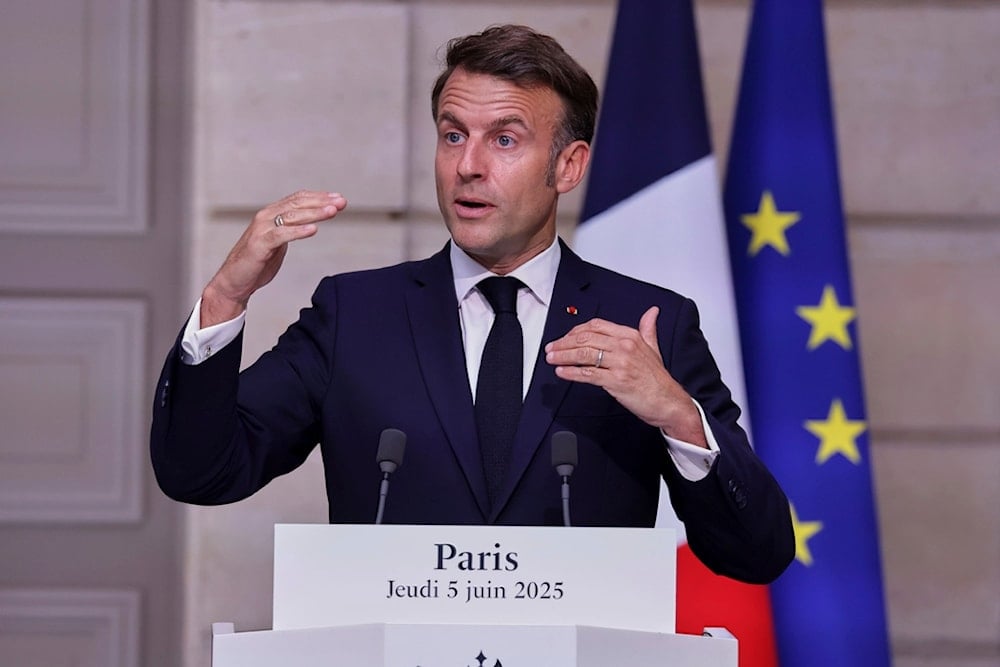Conference to recognize Palestinian state shifts to gradual steps
The planned peace conference in Saudi Arabia and co-hosted by France will now reportedly focus on building conditions for a "two-state" solution, amid international divisions.
-

French President Emmanuel Macron gestures as he speaks during a media conference with Brazilian President Luiz Inacio Lula da Silva at the Elysee Palace in Paris, Thursday, June 5, 2025 (Christophe Petit Tesson, Pool Photo via AP)
A planned peace conference in Saudi Arabia, initially expected to catalyze the recognition of a Palestinian state, has scaled back its ambition.
Instead of issuing a joint declaration, the event will now aim to agree on incremental steps toward recognition, The Guardian reported, citing diplomatic sources.
Scheduled for 17–20 June, the conference, co-sponsored by France and Saudi Arabia, was initially envisioned as a historic moment wherein a bloc of countries, potentially including France and the UK, would formally recognize Palestine.
However, diplomats now say such a move will be deferred in favour of practical measures to lay the groundwork for future recognition.
Read more: France urges global backing before recognizing Palestinian state
Peace conference will not serve as moment of recognition
French President Emmanuel Macron, a chief backer of the initiative, has described the recognition of Palestine as “a moral duty and political requirement.”
Nevertheless, French officials have reportedly assured their Israeli counterparts that the conference will not serve as the moment of recognition. That goal, they say, will emerge only if preconditions are met, chief among them a permanent ceasefire in Gaza, the release of Israeli captives, reforms within the Palestinian Authority, and an end to Hamas’ governance in Gaza.
France and Saudi Arabia have created eight working groups focused on laying the foundation for a "two-state" solution. Macron will also host a civil society gathering under the Paris Peace Forum banner just prior to the main event.
The UK will oversee the humanitarian track among the working groups, which also include economic viability, international law, post-war reconstruction, and long-term peace narratives. Another initiative, titled "Peace Day," is set to imagine the mutual benefits of a peaceful resolution.
While the US and "Israel" have attended preliminary discussions, neither has spoken at these sessions, leading to speculation that they may boycott the conference entirely.
Read more: Let France create Palestinian State in French Riviera: Huckabee
'Israel’s' opposition and settlement expansion
This comes as "Israel" continues to oppose Palestinian self-determination. Recent polling shows that only 20% of Israeli voters support a "two-state" solution, while 56% of Israeli settlers favour the “transfer of Arab citizens of Israel to other countries.”
"Israel" has recently approved plans to construct 22 new settlements in the occupied West Bank, the largest expansion in decades. Israeli Security Minister Israel Katz described the expansion as “a strategic move that prevents the establishment of a Palestinian state.”
Also, Macron's initiative was labelled “disastrous” by "Israel’s" ambassador to France, Joshua Zarka.
Recognition of a Palestinian state was once seen as the final outcome of a broader "two-state" peace process. Now, amid growing skepticism over "Israel’s" intentions, European governments are considering recognition as a tool to pressure Tel Aviv into re-engagement. Last year, Ireland, Spain, and Norway formally recognised Palestine.
Macron has stated he would only extend recognition under a future Palestinian government without Hamas, a position echoed by the UK.
Recognition as a matter of principle, not as leverage
In an open letter to Macron, The Elders, a group of former senior UN officials, argued that recognition should be treated as a matter of principle, not as leverage.
Anne-Claire Legendre, Macron’s Middle East advisor, said the conference should "mark a transformative milestone for the effective implementation of the two-state solution."
"We must move from words to deeds, and we must move from the end of the war in Gaza to the end of the conflict,” she added.
Legendre has met with both Israeli officials and Palestinian Prime Minister Mohammad Mustafa to discuss long-term regional strategies.
Israeli media reported that French officials have pointed out that recognition "remains on the table, but not as a product of the conference. This will remain a bilateral subject between states."
Read more: France clashes with 'Israel' over humanitarian situation in Gaza
Meanwhile, UK Foreign Secretary David Lammy, expected to attend the conference, faces mounting pressure from MPs to adopt a firmer stance against "Israel".
Hamish Falconer, the UK’s Middle East Minister, acknowledged this week that London’s traditional wait-and-see approach is being reconsidered. He cited recent Israeli rhetoric rejecting the two-state solution as a key reason for this shift in UK policy.
The UK is seeking assurances about the future governance of Gaza, particularly that Hamas will not play a role in governance.
Meanwhile, France hopes that recognition by a group of Western nations could be balanced by Arab states normalizing ties with "Israel."
However, Saudi Arabia remains firm in its stance. Crown Prince Mohammad bin Salman, the conference’s co-host, has repeatedly asserted that "Israel" is committing genocide, a sentiment widely echoed in Saudi public opinion.
As such, Saudi recognition of "Israel" appears off the table for the foreseeable future.

 5 Min Read
5 Min Read








